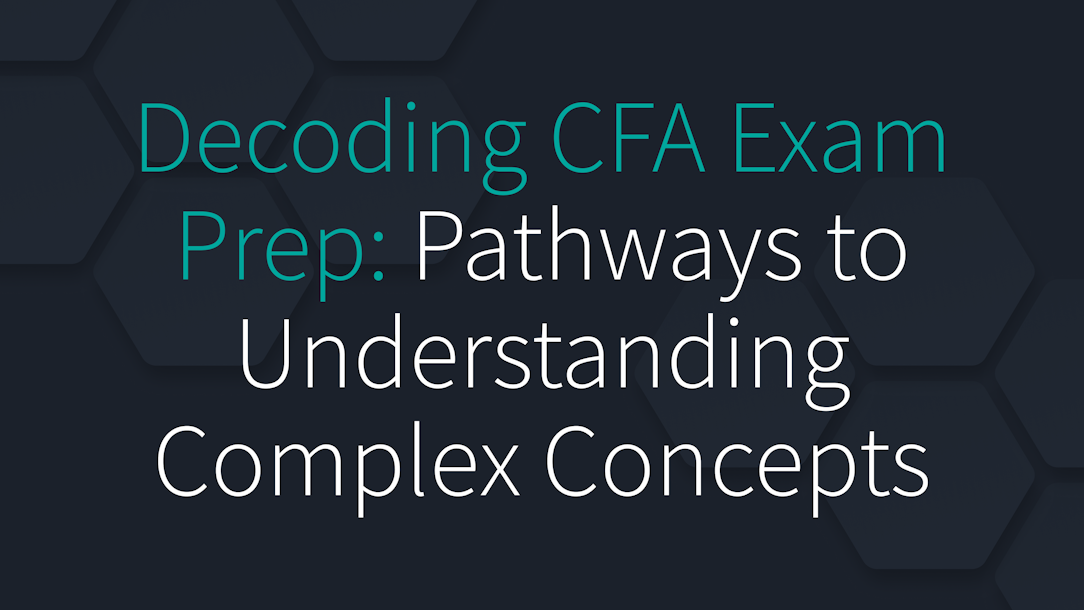
Decoding CFA Exam Prep: Pathways to Understanding Complex Concepts
Decoding the complexities of the CFA exam demands strategic learning pathways that break down challenging concepts, encourage active engagement, and connect theory with real-world application.
The CFA exam is renowned for its complexity and rigor, demanding not just memorization but a deep understanding of advanced financial concepts. From derivatives to portfolio management, CFA candidates face a steep learning curve as they progress through the three levels of the exam.
To succeed, it’s crucial to develop strategies that break down these difficult topics into manageable components. In this post, we’ll explore key pathways to mastering complex concepts in the CFA curriculum and how they can help you on your path to success.
The Nature of Complex Concepts in the CFA Exam
As you move through the levels of the CFA exam, the complexity of the material increases significantly. While Level 1 focuses on broad foundational topics, Level 2 dives deeper into analytical skills, and Level 3 tests your ability to apply those skills in real-world scenarios.
Concepts like financial modeling, derivatives, and portfolio construction require not just knowledge, but a sophisticated understanding of how these elements interact. Tackling this material requires a clear strategy.
Pathway 1: Breaking Down Financial Concepts Into Manageable Parts
One of the most effective methods for mastering complex concepts is chunking, or breaking down large topics into smaller, more digestible parts. Start with understanding the building blocks of each concept before progressing to more intricate details.
For instance, if you're learning Discounted Cash Flow (DCF) analysis, begin by mastering the time value of money and the components of cash flow before diving into valuation models. By simplifying the material, you allow yourself to absorb each part more effectively.
Pathway 2: Mastering the Art of Active Learning
Passive learning—like reading and re-reading—is not enough when preparing for the CFA exam. Active learning methods, such as creating concept maps or teaching the material to someone else, reinforce your understanding by engaging your brain in deeper cognitive processes.
Try sketching out how different topics connect, like how risk management relates to portfolio theory, and then test yourself regularly with quizzes or practice problems. This helps build confidence and clarity as you progress through the curriculum.
Pathway 3: Leveraging Real-World Examples
The CFA exam is designed to reflect real-world financial scenarios. To better understand abstract concepts, relate them to actual market events or case studies. For example, portfolio management strategies become easier to grasp when applied to actual client needs or investment cases.
By connecting theoretical knowledge with practical applications, you develop a more intuitive understanding, which can be invaluable when it comes time to face complex questions on exam day.
Pathway 4: Peer Discussions and Collaborative Learning
Engaging with fellow CFA candidates through study groups or forums can be an incredibly effective way to clarify tough concepts. Often, explaining a topic to others forces you to simplify and articulate your thoughts clearly, strengthening your own grasp of the material.
Additionally, hearing others’ perspectives or problem-solving approaches can shed light on different ways to tackle difficult subjects. Many online communities provide platforms for candidates to share insights and resolve doubts collectively.
Pathway 5: Utilizing Advanced Technology Tools for Learning
Technology has revolutionized CFA exam prep by providing tools that tailor learning to individual needs. AI-powered platforms offer adaptive learning paths that identify your weak areas and suggest targeted study materials.
Financial modeling software, interactive simulations, and AI tutors can help you visualize difficult concepts like portfolio construction or derivatives pricing in action. These tools provide immediate feedback, making it easier to adjust and fine-tune your learning process.
Pathway 6: Regular Revision and Reinforcement
Complex concepts require consistent reinforcement to stick. Regular revision using techniques like spaced repetition helps retain the material for longer. Practice exams and timed quizzes are essential for testing your ability to apply what you’ve learned under exam-like conditions.
Track your progress and review problem areas frequently to avoid cramming at the last minute. This continuous cycle of learning, revising, and practicing is key to long-term retention.
Pathway 7: Expert Guidance and Mentorship
Seeking guidance from CFA charterholders or experienced mentors can make a significant difference in your understanding of complex topics. Their insights can help demystify concepts and provide practical advice on exam strategies.
Many experts share their experiences through webinars, seminars, or study groups, offering invaluable support for candidates who may struggle with specific areas.
Conclusion
Decoding the complexities of the CFA exam requires more than just hard work—it demands strategic learning pathways that break down challenging concepts, encourage active engagement, and connect theory with real-world application. By using techniques like chunking, peer discussions, and leveraging advanced technology, candidates can simplify their study process and build a stronger foundation for success.
At Salt Solutions, we provide tailored study materials to help you navigate the challenges of the CFA exam. Whether you're preparing for Level 1, Level 2, or Level 3, our comprehensive resources, including video lectures and interactive quizzes, are designed to enhance your understanding. Explore our CFA Study Material Guide and take the next step in mastering the CFA exam today!